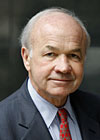
LAY | Getty Images
By Greg Farrell, USA TODAY
The late Ken Lay, the Enron founder who was convicted in May of deceiving investors about Enron’s finances, is once again innocent in the eyes of the law.
U.S. District Judge Sim Lake, who presided over the trial of Lay and his colleague Jeff Skilling in Houston earlier this year, issued an order Tuesday vacating Lay’s conviction and dismissing the indictment against him.
“The court concludes that Lay’s conviction must be vacated,” wrote Lake in a 13-page opinion. “The indictment against Kenneth L. Lay is dismissed.”
Ever since Lay died of a heart attack in Aspen, Colo., July 5, following his conviction at trial but before he had the chance to appeal the verdict, Lake’s ruling has been widely expected. As a matter of law, a conviction against a criminal defendant is not final until the defendant has had the chance to appeal the verdict. Therefore, Lay’s death short-circuited the full legal process to which he was entitled.
“Mr. Lay never had the chance to appeal,” said Sam Buffone of Ropes and Gray, who represented the estate of Ken Lay. “We were eager to appeal.”
Prosecutors fought an uphill battle against Lake’s decision, arguing last month that he should postpone his ruling until Congress had the chance to pass a new law changing the ground rules for defendants who died before getting a hearing before an appellate court. But Congress never seriously considered the new law.
The ruling is a boost for members of Lay’s family, who no longer face criminal forfeiture proceedings by the Department of Justice. After Lay was found guilty in May, Justice took steps to track down and seize $40 million from Lay, even though he testified in his trial that he was virtually bankrupt.
Justice, which plans to pursue forfeiture in civil proceedings, issued the following statement Tuesday: “Today’s ruling does not change the fact that Mr. Lay was found guilty after a four-month jury trial and a separate bench trial. We will continue to pursue all remedies available for restitution on behalf of the victims of the fraud at Enron.”
As for Skilling, Lay’s co-defendant, the ruling has no impact. In May, jurors convicted Skilling, who served as CEO of Enron in 2001, of 18 separate criminal charges. He is slated to be sentenced on Monday.
When Lay died in July, some Houston residents and former Enron shareholders vented their rage that he had escaped a prison term. Many, on the Web and on talk radio, demanded an autopsy. But an autopsy conducted in Aspen showed that Lay did indeed have heart problems, and that he died of natural causes.
Despite the dismissal of the indictment against Lay, some observers believe the former Enron CEO will never escape the shadow of his role in Enron’s collapse. “He’s innocent with an asterisk,” says Christopher Bebel, a Houston attorney who followed the case closely. “History will accurately record this episode, and the slate will not be wiped clean. When future generations look back, they will look at it as a situation where guilty verdicts were reached. A massive indictment was brought after $60 billion in market valuation evaporated, and a jury held him accountable.”
Defense: Politics behind Brocade charges
By Edward Iwata, USA TODAY
The attorney for former Brocade Communications CEO Gregory Reyes, charged with fraud in the federal government’s nationwide crackdown against suspected stock-option accounting abuse, says prosecutors and regulators are pressing forward on a weak case for political reasons. In a written statement, Richard Marmaro of the Skadden Arps law firm accused the Justice Department and Securities and Exchange Commission of playing politics and filing charges based on “some perceived need to show quick action in response to the stock-option issues being discussed in the media.”
Marmaro added: “When the evidence comes out in court, Mr. Reyes will unquestionably be found innocent, and everyone will wonder why the government charged him in the first place.”
Patrick Murphy, the SEC’s enforcement chief in San Francisco, said: “Our case is based upon the facts. We think there’s clear evidence that backdating occurred, that the defendants knew it.”
U.S. Attorney’s Office spokesman Luke Macaulay said: “This case is moving forward based on the strength of the evidence.”
The issue of political motivation arises often in criminal cases, but, “It rarely gets any traction,” says Christopher Bebel, a former SEC attorney in Houston. Judges typically bar evidence of that kind, he says.
Federal officials on Thursday charged Reyes and former Brocade human resources vice president Stephanie Jensen with criminal and securities fraud. Former Brocade chief financial officer Antonio Canova was charged with securities fraud. Attorneys for Jensen and Canova have also denied the charges.
The complaints were among the first charges to be brought against executives suspected of stock-option accounting manipulation. Federal officials are investigating 80 U.S. companies, and Justice Department and SEC officials say they plan to file more charges.
In the Brocade case, Marmaro also said that “financial gain is always a motive in securities fraud cases, and here, there was none.” He said the government has not alleged that Reyes “made any money through the alleged option irregularities” or even “granted himself any of the options at issue.”
Scott Balber, an attorney at Chadbourne & Parke in New York who is uninvolved in the case, says that “one problem the government clearly has is that nobody benefited financially from the backdating.”
Reyes did legally sell hundreds of millions of dollars of Brocade stock over several years. But that won’t look good to jurors in an era of corporate scandals and high CEO pay, says Andrew Stoltmann, a Chicago attorney at Stoltmann Law Offices, which is uninvolved in the case.
It’s not illegal to backdate stock options. But companies must disclose it to the SEC, and cannot manipulate the dates of grants to increase their value.

Leave a Reply
You must be logged in to post a comment.